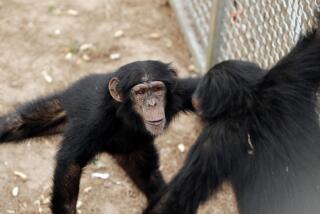‘Cultural intelligence’ gives toddlers advantage over chimps
- Share via
Toddlers as young as 2½ have better social skills than humans’ nearest primate relatives, chimpanzees, and display an innate “cultural intelligence” unique to humans, according to a study published today in the journal Science.
Lead author Esther Herrmann of the Max Planck Institute for Evolutionary Anthropology in Leipzig, Germany, said the research showed humans had distinctive abilities to understand nonverbal communication, imitate another’s solution to a problem, and read the intentions of others. These skills were necessary for people to acquire mathematics and language, and to participate in cultural groups with their own institutions and practices, she said.
The toddlers’ superior performance on tests provided insight into the evolution of human cognition, suggesting that the demands of a complex society drove development of the human brain, the report said.
Social skills “represent a special human adaptation for living and exchanging information among cultural groups,” Herrmann said.
Humans have brains roughly three times the size of chimps’, and scientists seek to understand why the species diverged 4 million to 7 million years ago.
One theory holds that larger brains endowed humans with a better memory, faster learning and greater capacity for planning. Such skills might have allowed early humans to better forage for seasonal berries and other fruits.
But many biologists and anthropologists consider that explanation incomplete. They believe that brain size correlates to a species’ need to manage relationships with family members, allies and rivals. Recent studies have found that apes and monkeys -- whose brains are large relative to the animals’ size -- share a range of behaviors with humans, suggesting that such traits as cooperation, empathy and using simple tools go back to a common ancestor. (In fact, another study in Science today from researchers at Harvard University and Boston University found that apes and monkeys were good at “reading” the intentions of others.)
The German report argues that people possess “ultra-social” skills not shared by other primates. That allows them to pass knowledge from one generation to the next and to participate in distinct and varied cultures, the researchers said.
The study compared 106 chimps, 32 orangutans and 105 toddlers in tests measuring physical and social abilities. The battery of tests took five hours.
The apes lived in animal sanctuaries in Africa and were 3 to 21 years old. The children were 28 to 32 months old and had been speaking for about a year.
In the physical tests, which included tracking objects, judging quantities and using simple tools, toddlers and chimps solved 68% of the problems correctly. Orangutans were correct 59% of the time. Chimps were the best at puzzles that tested addition skills, but toddlers were better at discerning shapes and the source of a noise.
On the social tests, which involved interpreting gestures and learning how to solve a simple problem, the toddlers solved 74% of correctly, compared with 33% for chimps and orangutans. For example, after an experimenter demonstrated how to open a plastic tube to obtain a treat, the apes tried to bite and break it open, whereas the toddlers followed the experimenter’s example.
“The human children were not more intelligent but had stronger social cognition,” Herrmann said. “Without these skills, children would progress very little beyond apes.”
Researchers not involved in the study acknowledged that children were ready learners, but wondered if the research sold chimps short.
Frans de Waal of Atlanta’s Emory University and the school’s Yerkes National Primate Research Center noted that the toddlers were tested by members of their own species, an advantage the apes didn’t share.
“It is entirely possible that this doesn’t make a difference in physical tasks, which focus on physical objects, but does make a difference in relation to social tasks, which by definition focus on the interaction between subjects and experimenter,” he said.
Robert Seyfarth, a psychologist at the University of Pennsylvania who studies primate behavior, said it was artificial to test chimps on human social skills.
“It is possible the apes would perform differently if tested on social skills important to them,” he said.





